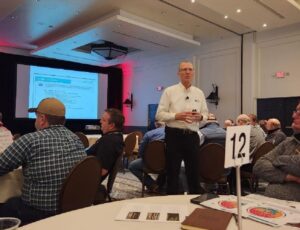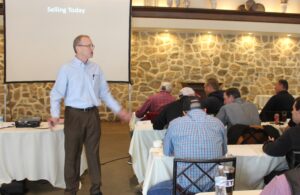Part 6 of “Knowing” how to sell is not enough
Our journey to eliminate the gap between what we know we should do and actually doing it continues.
Part 1: Knowing how to sell is not enough
Part 2: Talking too much.
Part 3: Routine versus a Rut.
Part 4: Fear & Conventional Wisdom holding you back?
Part 5: Ineffective Measures Killing Your Sales?
Today, we dig into the last cause: Competition
Our final topic on closing the knowing-doing gap revolves around competition, or more appropriately, an over-emphasis on internal competition.
Before going too far, I will tell you that I have Competition as one of my top 5 Gallup Strengths, as assessed by Clifton Strength Finders. I grew up in a house of 6 kids that competed for everything and actually still do. I was in youth sports and loved the competitive nature so much, I still compete in running races and triathlons. In selling, I consider winning the President’s Club Award one of my greatest achievements. So, trust me when I tell you that I love to compete and win.
However, I also believe that being overly focused on competition as described by Pfeffer and Sutton in their book, “The Knowing-Doing Gap” actually reduces performance.
They contend that we fail with competition in two ways:
- We compare sports competition to business competition
- We focus too much on internal competition versus external competition
Let’s start with sports. Most of us understand the importance of competition and what it does to enhance the sports world. It makes for great TV, but Pfeffer and Sutton contend athletic events are primarily routine physical activities that we know how to do: running, throwing, catching, etc. It’s reasonable to measure internally who is the best at running, throwing and, catching. And, award them the playing position. Business (selling) on the other hand is an intellectual activity that requires thinking to succeed as much as a physical activity. This thinking is enhanced by teamwork, knowledge sharing and interdependent departments. An over-focus on individual results through force ranking actually reduces the much-needed cooperative spirit, even if someone claims to be the biggest team player in the company. If a salesperson will be individually listed on a performance chart at the national sales meeting or the monthly managers meeting, there is a huge incentive for him to outperform his neighboring salesperson. To do that, you have less incentive to knowledge share or to resource share. You will fight harder to get scarce resources for yourself instead of what’s best for the company. Holiday weeks like this one are a perfect example. Most US businesses will be shut down Thursday and Friday for Thanksgiving. Manufacturing time and trucking availability are under pressure to deliver five days of products in three days. Salespeople will be calling in favors with operations managers and delivery dispatchers to take care of “their” customers.
Internal versus External competition: In most companies, managers get to their position by winning a series of competitions. They climb the ladder by winning the next rung. They sell a lot and are at the top of the charts. So, they are promoted to sales manager. Sounds like good reasoning and maybe it is. However, once in the position as a manager, they now focus on turning their department into a competition. The problem with this is that it’s a classic zero-sum game. There’s only one winner. The rest are labeled – losers. I can remember the negative effects a new manager had on creating three categories of salespeople based on their results. The three segments were Eagles, Hawks, and Buzzards. The theory was, no one wanted to be in the buzzard category and they would work hard to get out of it. Pfeffer and Sutton explain that instead, these competitive exercises actually achieve the opposite of what we are trying to accomplish as a leader. We get less cooperation, less interdependence. Worst of all, we focus on beating our neighbor instead of beating out the external competitor.
Realizing the negative impact that labeling salespeople had on the team, our manager changed his approach and our disengagement with him went down. Lesson learned. The main lesson is to turn the competitive spirit towards the real competition. Then you have something to rally the team around. Then people will cooperate, share their knowledge and bring all their resources to the selling process.
Many regard Edwards Deming as one of the most brilliant business minds ever. Mildly put, he was considered an expert in process improvement, quality, and organizational structure. However, he had an interesting view on competition. He actually opposed giving school grades, force ranking of employees on reviews or any statistic that measured individual performance. In his opinion, when the individual wins, the team loses. His solution instead was to measure the team and rely heavily on learning and leadership to improve performance. While maybe a little extreme to think of not measuring an individual salesperson, his idea does point to focusing the competitive spirit in the right direction – competing against your external competitor and not your fellow employees.
In closing, I hope you enjoyed this 6-part breakdown of how to avoid the knowing-doing gap. The reason for such a heavy emphasis on it is that I see it first hand every day as a sales coach and trainer. In workshops, I encounter experienced sales people who tell me they know everything we cover in my workshop. In many cases, they have been through sales training several times in their career. “Oh, yeah, I know all that,” they tell me. Then, we jump in the truck and head out for some farm calls and I get to see firsthand how they sell. This is where the training proves its value as I get to see what they really do.
Recently, I rode with a salesperson who was experienced and considers herself to be a fairly competent salesperson. On our ride along, as I usually do, I questioned her on her pre-call planning. She had no real thought behind calling on these accounts. The reasons she mentioned were: they are in the area, she hadn’t seen them in a while and she thought she could catch them at their shop. However, she was interested in taking me to one prospect in particular. “Why”, I asked. She explained that she had been calling on this prospect for the last year but could never get him to buy. Questioning her about her approach and which products she has attempted to sell, I couldn’t figure out how to help her. Finally, I asked, “What does he say when you ask a closing question?” Her reply said it all. There was a long pause before she said, “I’ve never really asked a closing question.”
“You gotta do it or knowing is no better than not knowing”
If you found this to be helpful, forward on to someone you know who might also appreciate it.




